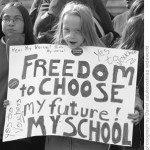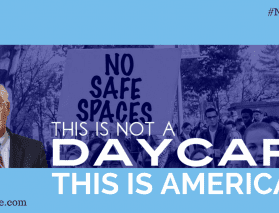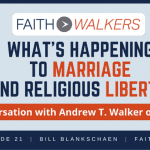National School Choice Week 2013, which runs from Jan. 27 through Feb. 2, shines a spotlight on the need for education opportunities for all. In only its third year, this bipartisan, grassroots effort features more than 3,500 events spanning all 50 states.
This is a guest post from Dr. John Hamilton, Professor of Communication & Cinema at Azusa Pacific University, a Fellow at the Center for Cultural Leadership, and Executive Producer of Del Rey Communications (www.delreycommunications.com).
When it comes time to collect taxes from me, particularly property taxes used to fund the local public school, then believe me, brother, I am considered to be part of the public — the tax-paying public. My dollars are just as coveted and conscripted as anyone else’s.
But a funny thing happens after that money is collected. When it comes time to disburse the taxes for education, suddenly I am not considered part of the public, because I happen to want a Christian education for my children.
 Now I am considered private, even though the school my children attend is public in every way. It accepts kids from all walks of life, all faiths, all ethnicities. The school is not parochial, that is, it is not run by an ecclesiastical body or church, but by a school board made up of parents. So why is it now deemed private by the state tax collectors and disbursers, so that I can’t get back any of the $7,000 per child that is spent on everyone who attends the monolithic, state-run public school?
Now I am considered private, even though the school my children attend is public in every way. It accepts kids from all walks of life, all faiths, all ethnicities. The school is not parochial, that is, it is not run by an ecclesiastical body or church, but by a school board made up of parents. So why is it now deemed private by the state tax collectors and disbursers, so that I can’t get back any of the $7,000 per child that is spent on everyone who attends the monolithic, state-run public school?
Is there only one public? Are there not many publics that make up this great country?
Round and Round We Go
There’s a perverse circular reasoning here. Why can’t we get a voucher for a school choice so we can send our children to the school of our choice, one in line with our beliefs and philosophy of education? It’s because we have beliefs not endorsed by the powers that be in the educational establishment. Consequently, we are marginalized as private, while they get to call themselves public. And so they get all the money, including mine.
But our school is public, that is, it is open to the public without discrimination. Yet we are told, “You can’t have any tax funds because you are a private school.” Why are we private? “Because you are not public.” Why aren’t we public? “Because you don’t get any state funding.” Round and round we go.
But Doesn’t Public Mean Neutral?
One might say, the state school is neutral and free of ideology, while your Christian school operates out of a belief system. Our Constitution says there is a separation of church and state.
Hold on, who changed the subject here? Our Christian school isn’t a church; it’s a school, not even managed by a church. Anyway, the First Amendment guarantees the “free exercise of religion,” not the elimination of belief from public life.
And clearly the public school is not neutral, free from a philosophy, or non-religious. All schools are religious, none are neutral, insomuch as all education is based on a belief system. The current state school system is based on the belief system of Secular Humanism. Becasue that system is the dominant faith in modern society, it has defined itself as neutral and unassailable. Nonbelievers are marginalized as private.
I respect those who say that the government should not be involved in schools at all (the separation of school and state!); therefore, we should not take any funding from the state, especially because funding brings oversight and interference. But there will be always be interference of some sort anyway via fire codes, labor regulations, etc.
And if the state is going to take our tax dollars for education, we might as well get our fair share back. Under the current system, the state counts on a percentage to opt out of their one-size-fits-all schools to keep their costs down. But isn’t this inherently unfair? Why should everyone pay for the schools of just the secularists who want the government-run schools? It’s a simple matter of fairness.
Whatever Happened to Choice?
When the Children’s Scholarship Fund, founded in 1998 by Ted Forstmann and the late John Walton, started offering tuition grants for low-income families to attend non-public schools, the phone lines were jammed after their appearance on The Oprah Winfrey Show. Thousands and thousands of families, in the inner cities especially, craved an alternative to the state-controlled schools. These parents weren’t segregationalists or weird cultists, just ordinary families who wanted choice.
These so-called private schools usually offer a quality education at half the cost that the state spends, as the rousing success of many Latino-dominated urban Catholic schools testifies.
Research shows that even home schooling produces students who do better on every standardized test. Yet these students are denied the opportunity to go to the school of their choice which may be unaffordable once their parents have already been compelled to pay taxes for a school they cannot endorse or use for their children.
[Bill: Report on research on homeschooling test results via The Washington Times available here. Key graph below.]
Five areas of academic pursuit were measured. In reading, the average home-schooler scored at the 89th percentile; language, 84th percentile; math, 84th percentile; science, 86th percentile; and social studies, 84th percentile. In the core studies (reading, language and math), the average home-schooler scored at the 88th percentile.
The average public school student taking these standardized tests scored at the 50th percentile in each subject area.
What If We Tried Being Fair?
How about we do this — everybody pays in, and then everybody gets his or her fair share when it comes time to pay out?
Parents, the ones responsible for their children’s upbringing, can delegate the educational process in part to schools of their choice, whether Secular, Christian, Montessori, Buddhist, or whatever suits them. This is called freedom of choice, without a religious or philosophical penalty for those with diverse points of view.
Following the idea of the First Amendment, we can then not establish the religion of Secularism by favoring any one version of the academy.
—
Next up on School Choice Week: Why Homeschool Is the Best School
Related Links on School Choice: “MLK’s unfinished legacy and the fight for school choice”
School Choice for Ohio with links to other resources.
















